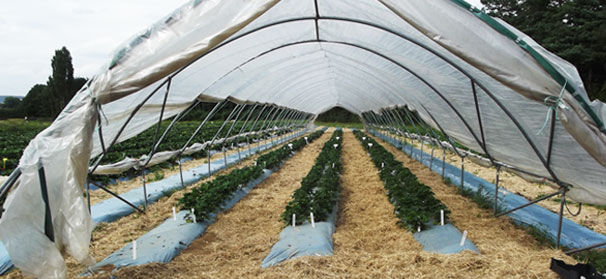

Sep 16, 2011Tunnels, varieties double UK berry yields
Strawberries are “far and away” the most valuable fruit crop grown in the United Kingdom, said Dave Simpson, who’s been breeding strawberries at East Malling Research (EMR), a fruit research facility in East Malling, England, for 25 years.
Strawberries became a “bit of a darling” with UK supermarkets and consumers in the last decade or two. Their annual farm-gate value now equates to about $448 million, compared to about $160 million each for apples and raspberries and about $24 million for pears, Simpson said.
Strawberries are grown on about 5,000 hectares in the United Kingdom (equivalent to 12,300 acres), which produce about 110,000 tons of berries annually. The average yield per hectare is slightly over 20 tons, but a good grower would expect to average 25 tons – maybe even 30 tons in a good year, with the right variety, according to Simpson.
Thanks to a combination of plastic tunnels, intensive production systems and new varieties, the average UK strawberry yield has doubled since 1995. Eighty-five percent of the UK crop is now grown under tunnels – usually large, multi-span configurations, he said.
One of the advantages of tunnels is extending the growing season, which now lasts from late April to the end of October. That period coincides with the highest retail sales, which means UK growers can supply a good proportion of the market during the peak sales period, Simpson said.
Tunnels also keep rain off the crop. Most UK strawberries are grown in eastern and central England or eastern Scotland – which has lower rainfall than the rest of the country but still averages 900 millimeters a year, half of which falls in spring and summer. Heavy rains can damage crops and interrupt picking schedules. Unpredictable weather is one of the challenges of growing strawberries profitably in the United Kingdom, he said.
Breeders like Simpson select for traits like flavor, texture, sugar level and color. UK consumers prefer lighter-colored strawberries, which is why Simpson has been experimenting with Serenity at EMR. Serenity is a paler clone of Florence – a variety that growers like because it’s easy to grow and has good flavor, but they hardly plant anymore because it’s too dark for the UK market, he said.
Other EMR personnel study strawberries, too. Mark Else, a physiologist, has been trying to find more efficient ways to irrigate them without reducing yields or quality.
A few years ago, EMR sent out a questionnaire to UK strawberry growers asking how much water they used to produce 1 ton of class-one strawberries. The average amount ended up being 78 tons of water (over two seasons). More water-conscious growers used between 45 and 50 tons, while others used up to 160 tons, Else said.
“Often, growers tend to irrigate just as they’ve always done,” he said. “They don’t necessarily know how much water they’re applying.”
Under various scientific conditions, EMR researchers managed to lower the amount of water used to produce 1 ton of class-one strawberries from 78 tons to 10 tons – an 85 percent savings, Else said.
“We found that by changing the way we irrigate – putting water on at specific times in the right place – we can not only maintain yield but also improve fruit quality and shelf life.”
Growers are currently testing EMR’s irrigation regime on their own farms. So far, they’ve saved between 30 percent and 35 percent of their water without affecting yields or quality (they can save an equal amount of fertilizer if they add that to their irrigation water), Else said.
By Matt Milkovich, managing editor














